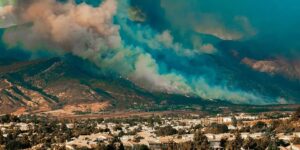Search
SUPPORTING WILDFIRE RECOVERY AND RESILIENCY IN THE GREATER BAY AREA REGION
October 13, 2021
What should we consider as we grapple with a “new normal” for a CA wildfire season that exacerbates inequalities that have already grown too wide?
By Kevin Zwick, CEO, United Way Bay Area
United Way Bay Area mobilizes the Bay Area to assist people living in poverty and to dismantle the root causes of poverty. We support workers and students seeking employment and better careers, help families struggling to meet basic needs, support our neighbors toward achieving their financial stability goals, and advocate for housing justice for all Bay Area residents. It would be impossible to achieve our mission without addressing the devastating effects of wildfires.
Every time there’s a wildfire in our region, the number of families struggling to meet basic needs goes up. And I don’t have to tell you that wildfires are happening more often. But I was stunned to read in the newspaper recently that 1 of every 8 acres in the state has burned in the past 10 years, up more than double the 6.4 million acres that burned in California during the previous decade
With each wildfire (or mega-complex fire), more people are being displaced, more property and homes are being lost, more evacuations strain our social safety net, and first-responders and fire departments are stretched thinner. These effects also have a greater impact on those who were already struggling.
Disasters — and the way we respond to them — actually drive deeper inequality. A growing body of research points to the fact that disasters affect people in vastly different ways depending on their income level. For some, a fire might be an inconvenience at worst, but for others, the disaster can be life-changing. For instance, evacuation comes with the cost of gas, missed work, hotel rooms, and other expenses. Poverty rates climb by “one percentage point in areas hit by super-severe disasters,” one recent study found. Further, richer communities have more philanthropic dollars at the ready, stronger tax bases to finance rebuilding, and FEMA aid which disproportionately flows to wealthier areas.
Even among neighbors in the same community impacted by disaster, the lower-income, less wealthy residents will be worse off while neighbors who are middle or upper-income and wealthier will not only suffer less of a loss, they will sometimes even come out ahead. This is largely because aid is distributed based on the value of property damaged, benefitting those who own more property. However, it was even found that the poorest renters were 23% less likely than higher-income renters to get housing help in an evaluation of FEMA aid.
To combat this cycle of inequality, we need short-term efforts to make sure communities have the resources they need to respond to the immediate crisis of evacuations, property loss, job loss, and trauma. We need mid-term efforts to make sure organizations, local government, and first-responders are able to have year-round responses to wildfires and can plan throughout the year to be ready to act fast when outbreaks arise. And, we need long-term solutions that address climate change, and the need to change patterns of growth in our state and region to keep development from increasing in areas most at-risk to wildfires, which will only become more frequent and more intense over the coming years.
Last year the CZU, LNU, and SCU Lightning Complex Fires, among others, burned 4.2 million acres, destroyed 10,488 properties, and temporarily displaced at least 53,000 people. Immediately in response, UWBA joined with our neighbor United Ways – United Way Wine Country, United Way of Santa Cruz County, and United Way of Monterey County – to band together for a unified response for our Greater Bay Area and Central Coast region, that was focused on providing equity-informed support where it was needed most.
Through these efforts, we collectively raised $1.6 million, which assisted over 10,000 families and individuals. As there is not one single way to be affected by wildfires, we do not use a one-size-fits-all approach to support our region. In some areas, it makes the most sense to provide assistance to organizations on the ground to increase their capacity; in other areas, we need to quickly disburse gift cards for food, gas, and other necessities directly to individuals as fast as possible. By combining forces we can leverage our local networks, knowledge, and trust to get help where it’s needed most.
This year, the wildfires are hitting Northern California especially hard. The Dixie Fires and the Fawn Fire remind us that wildfires are devastating, disruptive, and dangerous, and can start and spread quickly. They also show us how interconnected we are as a state – many Bay Area households have families, friends, coworkers, businesses, and properties in Shasta, Lassen, and Butte Counties, where these fires burned (and luckily are mostly contained). However, given the dryness of this past year, and recent fire season trends, we are still at risk in the Greater Bay Area, Central Coast, and Northern Coast areas for at least another month.
In response to the 2021 California wildfire season, United Way Bay Area has once again joined forces with our neighbor United Ways organizations to deliver relief assistance and long-term recovery resources for affected residents and community agencies through the Greater Bay Area Central Coast Relief Fund
The Lake County Cache Fire, where more than 50 homes burned to the ground, triggered the opening of the fund this year. It will provide immediate and long-term support for victims of the Cache Fire and any others that occur this year, including: evacuation housing assistance through vouchers or cash, cash assistance to displaced families, food and rent assistance, case management services, and mental health counseling.
WEBINAR REPLAY: California Wildfires and the Road Ahead
October 28, 2021, at 12PM (PDT) as United Way Bay Area hosts California Wildfires and the Road Ahead, a conversation about what lies ahead on the road to recovery. UWBA CEO, Kevin Zwick, will be joined by San Jose Fire Chief Robert Sapien, Bay Area Council Economic Institute Executive Director Jeff Bellisario, Puente Executive Director Rita Mancera, and co-host United Way of the Wine Country CEO Lisa G. Carreño. The online event is free and open to the public.



